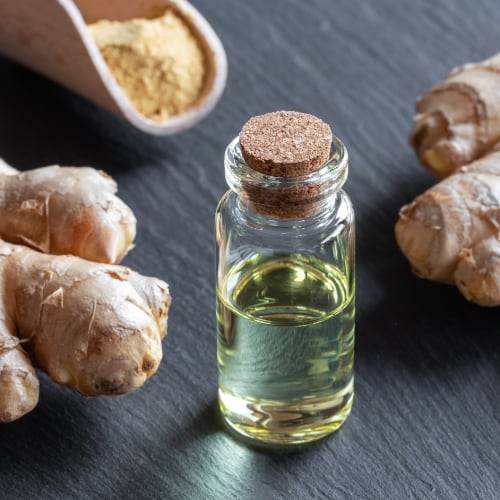If you’ve ever found yourself caught in the grip of nausea, you know it’s a real buzzkill. But fear not, because we’re about to explore the ultimate game-changers in the battle against that queasy feeling – 6 Best Essential Oils for Nausea.
These aren’t your run-of-the-mill scents; we’re talking about potent elixirs that bring relief in a bottle.
From the comforting warmth of Ginger Essential Oil to the crisp coolness of Peppermint Essential Oil, we’re about to embark on a journey through nature’s remedy cabinet.
Say goodbye to feeling under the weather and hello to the sweet, soothing scents that are about to become your nausea-fighting sidekicks!
Let’s dive into the world of essential oils and reclaim that equilibrium!
What causes nausea?
Nausea is a common experience that can leave us feeling uncomfortable and queasy.
- Motion sickness: Rollercoasters, bumpy rides, and motion can bring on nausea.
- Morning sickness: Nausea may arise due to hormonal fluctuations during pregnancy.
- Tummy troubles: Gastroenteritis, acid reflux, and food poisoning can upset the stomach.
- Underlying conditions: Migraines, vertigo, gallbladder issues, and kidney problems can cause nausea.
- Medications: Some drugs, like chemomeds or painkillers, can have nausea as a side effect.
- Emotional factors: Anxiety, stress, and emotional distress can also contribute to feeling queasy.
Top 6 Essential Oils for Nausea
We’ve curated a list of the 6 top essential oils for nausea, each a fragrant powerhouse ready to tackle queasiness.
From the warm embrace of Ginger Oil to the invigorating burst of Peppermint Oil, these oils go beyond pleasant scents; they are your aromatic allies in the battle against nausea and other illnesses like fever and sore throat.
1. Ginger Oil
Ginger oil, derived from the zesty ginger root, is a powerhouse for combating nausea. Its warming and spicy aroma has been used for centuries to ease digestive discomfort and calm an upset stomach.

Ginger oil contains compounds like gingerol and zingiberene, which have anti-inflammatory and soothing properties. These properties make ginger oil an excellent choice for relieving nausea caused by morning sickness during pregnancy or digestive issues. Inhaling the refreshing scent of ginger oil can help reduce nausea.
Dilute ginger oil with a carrier oil and then apply it topically to the abdomen for targeted relief. Additionally, ginger oil can be consumed in small amounts, such as adding a drop or two to warm water or tea to support healthy digestion and alleviate nausea.
2. Peppermint and Spearmint Oil
The refreshing and minty duo of peppermint and spearmint oils are well-known for their ability to soothe the stomach and relieve nausea.
Peppermint oil has a cooling effect (menthol) and can help relax the gastrointestinal tract muscles. This can be extremely helpful in reducing symptoms of nausea and digestive discomfort.

With its gentle and uplifting aroma, Spearmint oil can also relieve nausea. Inhaling the refreshing scents of these oils can help ease nausea and promote a sense of calm.
Add peppermint or spearmint oil drops to a diffuser or inhale the fragrance directly from the bottle. Additionally, you can consume peppermint or spearmint tea, made from the leaves of these plants, to help soothe the stomach and alleviate nausea.
3. Lemon Oil
The zesty and citrusy aroma of lemon oil uplifts the spirits and relieves nausea. Lemon oil is known for its cleansing properties, making it ideal for supporting healthy digestion. Inhaling lemon oil’s bright and refreshing scent can help ease nausea and provide freshness.

Add a few drops of lemon oil to a diffuser for quick relief. Additionally, you can dilute lemon oil with a carrier oil. Then, apply it topically to the abdomen for targeted support.
Lemon oil can also be consumed in small amounts, such as adding a drop or two to a glass of water, to promote healthy digestion and alleviate nausea.
4. Lavender Oil
With its calming properties, lavender oil can be a valuable ally in managing nausea. While lavender is often associated with relaxation and stress relief, it can also help alleviate feelings of nausea.

Inhaling the gentle floral scent of lavender oil can promote a sense of tranquility and provide relief from nausea.
Add a few drops of lavender oil to a diffuser or inhale the aroma directly from the bottle. For topical application, dilute lavender oil with a carrier oil and apply it to the temples for a calming effect. Additionally, lavender oil can be added to a warm bath to create a relaxing experience that can help ease nausea.
5. Cardamom Oil
With its warm and spicy aroma, Cardamom oil is a lesser-known but influential essential oil for combating nausea. This oil has been traditionally used in Ayurvedic drugs to support healthy digestion and ease stomach discomfort.

Inhaling the comforting scent of cardamom oil can help soothe the stomach and alleviate nausea. Place a few drops of cardamom oil in a diffuser or inhale the aroma directly from the bottle.
Additionally, you can dilute cardamom oil with carrier oil and apply it topically to the abdomen for targeted relief. Cardamom oil can also be consumed in small amounts, such as adding a drop or two to warm water or tea to support healthy digestion and alleviate nausea.
6. Cinnamon Oil
Cinnamon oil’s sweet and spicy scent adds a delightful aroma to your surroundings and can relieve nausea. Cinnamon oil has been used for centuries for its digestive benefits and can help calm an upset stomach. Inhaling cinnamon oil’s warm and comforting scent can help ease nausea and promote well-being.
Add a few drops of cinnamon oil into a diffuser, or inhale the aroma directly from the bottle. For topical application, dilute cinnamon oil with a carrier oil and apply it to the abdomen for targeted support. Additionally, you can consume cinnamon tea from cinnamon sticks to help soothe the stomach and alleviate nausea.

Expanding on our exploration of top essential oils for nausea, consider Fennel oil for its digestive benefits and anti-nausea properties. Chamomilla oil is another valuable option in our lineup of essential oils for nausea relief.
Dive into the refreshing Lemongrass oil and comforting nutmeg oil, contributing to a holistic approach to managing nausea. Together, these essential oils collectively offer a diverse range of natural remedies for addressing discomfort.
So, my friends, these top essential oils offer a range of aromatic allies to help you find relief from nausea. Whether you prefer inhalation, topical application, or diffusion, these oils can be valuable additions to your natural remedy toolkit. Embrace their soothing scents and let them work their magic in bringing you the comfort and well-being you deserve.
How to use Essential Oils for Nausea
From diffusion to inhalation, topical application to aromatherapy jewelry, and even steam inhalation, there are plenty of options to suit your preferences.
So, get ready to embark on an aromatic journey and discover how these wonders can bring you soothing relief.

Diffusion
Let’s set the mood with some aromatherapy magic! Add a few drops of your favorite essential oil to a diffuser and let the aromatic molecules work their wonders. As they disperse throughout the room, you’ll create a calming and refreshing atmosphere that can help ease your nausea. It’s the perfect passive approach for a consistent and delightful experience.
Inhalation
Need quick relief? No problem! Grab a tissue and add a drop or two of your essential oil. Take a deep breath and let the aroma work its magic as it permeates your senses. You can inhale the scent directly from the bottle if you’re on the go. It’s a convenient and immediate solution to help you feel better in no time.
Topical Application
It’s time to give yourself some TLC! Dilute your essential oil with a carrier oil like coconut or jojoba, and gently apply it to your pulse points or abdomen. This method allows direct absorption through the skin, giving you a more targeted and long-lasting effect. Soothe your nausea with some self-care and let the oils work their wonders.
Aromatherapy Jewelry
Who says you can’t be stylish and enjoy the benefits of essential oils simultaneously? Invest in diffuser jewelry, like bracelets or necklaces designed to hold your favorite scents. Add a drop or two to the jewelry, and you’ll carry the aroma wherever you go. It’s a fashionable and continuous way to enjoy the soothing effects of your chosen oil throughout the day.
Steam Inhalation
Let’s steam away that nausea! Enhance your relaxation by adding a few drops of essential oil to a bowl of hot water, creating your own mini-spa experience. Cover your head with a towel, creating a cozy tent, and inhale deeply. The steam will carry the aromatic goodness straight to your senses, providing a delightful scent and soothing relief. It’s especially effective for respiratory-related nausea, giving you a breath of fresh air.

So, whether you prefer diffusing, inhaling, applying topically, using aromatherapy jewelry, or enjoying a steam inhalation, there are plenty of ways to incorporate essential oils for nausea relief into your routine. Choose the method that suits you best and let the power of these aromatic wonders work their magic in alleviating discomfort. Enjoy the journey!
Any side effects to using essential oils for nausea?
Let’s discuss the potential side effects of using essential oils for nausea relief. While these aromatic wonders can offer significant benefits, one must know a few things to ensure a safe and enjoyable experience. So, grab a cup of tea and plunge into essential oils and their possible side effects!
- Skin Irritation: Essential oils may cause skin irritation, emphasizing the importance of proper dilution and performing a patch test to check for sensitivities.
- Allergic Reactions: Individuals may experience allergic reactions, necessitating caution and awareness of personal sensitivities.
- Respiratory Issues: Inhalation methods, such as diffusing oils, are generally safe, but those with respiratory conditions should exercise caution.
- Special Populations: Pregnant women, nursing mothers, and individuals with specific medical conditions or allergies should consult healthcare professionals before using essential oils.
- Quality Matters: Opt for high-quality, pure essential oils from reputable sources to minimize the risk of contaminants or adulteration.
- Contraindications: Pay attention to specific contraindications for each oil, as some may not be suitable for particular populations or medical conditions.
- Mindful Usage: Always use essential oils mindfully, following recommended guidelines, and consult healthcare providers if there are concerns or persistent side effects.
Unlock the Power of Essential Oils for Nausea
So there you have it! Essential oils for nausea can be an excellent natural remedy, but using them wisely is crucial, my friend.
Consult a healthcare professional or certified aromatherapist to ensure safe and effective use.
Always follow proper guidelines and dosage recommendations, whether inhaling the soothing scents, applying them topically, or even considering ingestion.
By taking these precautions and seeking professional advice, you can confidently explore the potential benefits of essential oils and find relief from nausea naturally and holistically.
Here’s to a happier, healthier you!